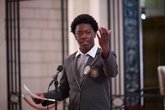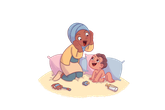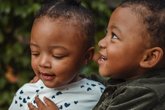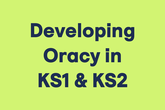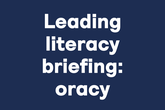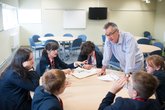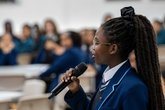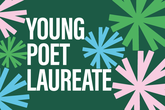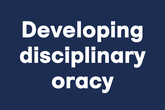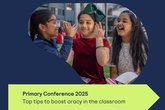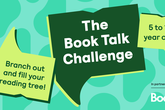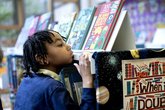What is oracy?

Oracy can be defined as the range of skills and techniques that we use to express our thoughts verbally, which includes how well we listen, understand and respond.
Oracy is not about speaking with a particular accent, dialect or even language. We believe that every child – irrespective of their background – should be empowered to find, develop and express their authentic voice.
Why is oracy important?
Research shows that the quality of a child’s early language development is a powerful predictor of their future academic success and life chances. The research is clear that those children who are supported to develop strong language skills in their earliest years are more likely to succeed in school and work and lead happier lives.
It is therefore fundamental that we give due attention to empowering and equipping all children with the vital oracy skills they need for life.
Children who struggle with spoken language at age five are six times more likely to fall below the expected level in reading and writing at age 11. This trend continues through to GCSE level and beyond.
What are the benefits of strong oracy skills?
Oracy skills are just one of the essential literacy skills we need to thrive. However, there are many benefits to having strong oracy skills. These skill can enable children and young people to:
- have the confidence and skill to express their own thoughts and opinions.
- learn and ask questions to seek more information, evaluate, debate and scratch below the surface.
- collaborate with other people - sharing creativity and developing an idea.
- listen with understanding and empathy.
- engage critically with the world around them in order to grasp their reality, take part in civic responsibilities and, especially in an increasingly digital age, to critically analyse information, media and news that they might be presented with.
- seek clarification or further information.
- advocate for their civic rights and the rights of others.
Children, young people and adults alike should have opportunities to celebrate the language(s) that they speak, develop confidence in communicating across difference settings, registers and genres, and learn how to build and maintain happy and healthy relationships.
How we equip children and young people with oracy skills
At the National Literacy Trust we support children to develop good language and communication skills from birth and through all phases of their education into adulthood. Part of our work across programmes, resources and research includes a focus on oracy which we believe is fundamental for ensuring that every child is equipped with the literacy skills they need to thrive in the modern world.
Discover a raft of ways you can get involved whether that is through CPD training and workshops to be equipped to teach or how you can support us to be part of the story to empower children and young people with techniques to develop their oracy skills.
Research
-
Our 2024 policy report explores how the government can help every child find their voice.Learn more
-
Report on the confidence of young people aged 16-30 in communicating their opinions on a range of issuesLearn more
-
An overview of our research into speaking, listening and associated skills and behavioursLearn more
Resources, training and programmes for educators
-
In a digital-first world, the ways in which children and young people engage with language are evolving rapidly.Learn more
-
This programme supports babies and toddlers who may need early help with speech, language and communication before the age of two.Learn more
-
Together, we will empower every child with the words they need to write their own story.Learn more
-
This one-day workshop examines oracy as a key element of primary literacy and provides strategies for improving speaking and listening in the classroom.Learn more
-
Expert guidance and tools on how to lead oracy.Learn more
-
This oracy resource for secondary school teachers covers how different types of talk can be explicitly taught and practised in the classroom to develop pupils’ oracy skills.Learn more
-
We are on a mission to grow the next generation of confident communicators.Learn more
-
Find out how we provide children and young people with new opportunities to explore and discover poetry in their schools and communities.Learn more
-
This training explores the role of talk as a tool for learning and promotes different ways of implementing exploratory talk activities in the classroom.Learn more
-
How can we empower confident communication across written and oral ability?Learn more
-
Activate the power of book talk in your school community with a new reading challenge that will build confidence, engagement in reading and motivation to read among...Learn more
